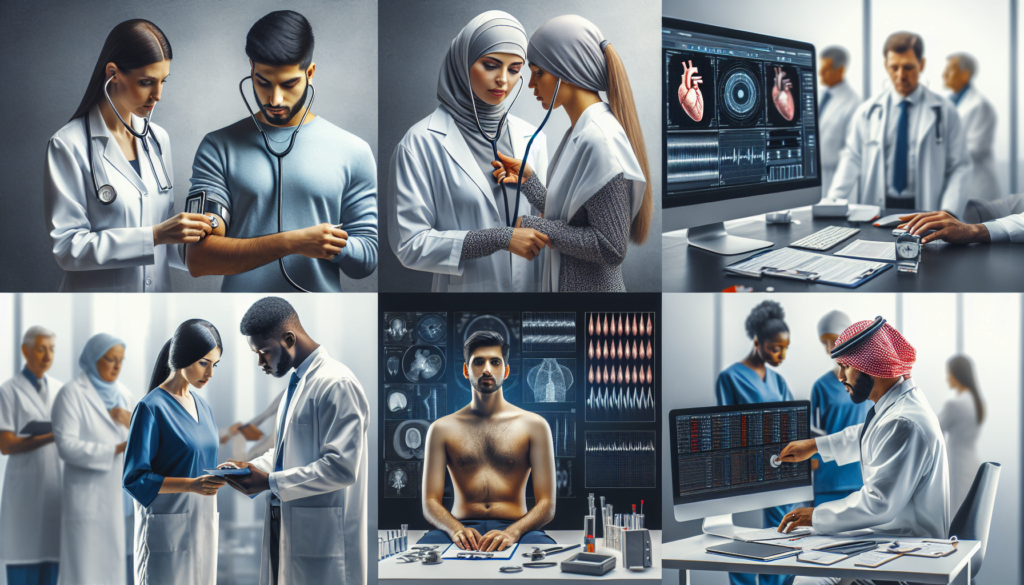In the hustle and bustle of life, it’s easy to overlook the importance of regular health check-ups and screenings. Yet, these routine medical visits are crucial to maintaining good health and preventing disease. They provide an opportunity for early detection of potential health issues, leading to more effective treatment and better outcomes. So, why should you prioritize regular health check-ups and screenings? Let’s delve into the details.
Key Takeaways
- Regular health check-ups and screenings are vital for early detection and treatment of diseases.
- Preventive care, including vaccinations and cancer screenings, plays a significant role in maintaining overall health.
- The patient’s role in healthcare is crucial, including self-awareness and open communication with healthcare providers.
- Modern healthcare approaches incorporate the latest medical advancements in routine checkups.
Introduction to the Importance of Regular Health Check-Ups and Screenings
Overview of Health Benefits from Routine Medical Checkups
Regular health check-ups and screenings are more than just a routine visit to the doctor. They are a proactive approach to managing your health. These visits can help identify potential health issues before they become serious, allowing for early intervention and better health outcomes. Regular check-ups also provide an opportunity to update vaccinations, monitor your risk for certain diseases, and establish a good relationship with your healthcare provider.
The Role of Regular Health Checks in Comprehensive Healthcare
Regular health checks are a cornerstone of comprehensive healthcare. They provide a holistic view of your health, taking into account your physical, mental, and emotional wellbeing. Regular check-ups can help detect diseases like diabetes, heart disease, and cancer at their earliest stages when they are most treatable. They also provide an opportunity to discuss any health concerns or lifestyle changes that may impact your health.

The Essentials of Preventive Care
Importance of Staying Up to Date on Cancer Screenings
Cancer screenings are a vital part of preventive care. They can detect cancer before symptoms appear, increasing the chances of successful treatment. For example, mammograms can detect breast cancer early, and colonoscopies can find precancerous polyps that can be removed before they turn into cancer. Staying up to date on these screenings is crucial for early detection and treatment (source).
The Significance of Vaccinations in Preventing Disease
Vaccinations are another essential aspect of preventive care. They protect against various diseases, including measles, mumps, rubella, hepatitis, and the flu. Vaccinations not only protect the individual but also help prevent the spread of these diseases in the community. They are a simple and effective way to stay healthy and prevent disease.
How Preventive Care Supports Overall Health Maintenance
Preventive care, including regular check-ups, screenings, and vaccinations, plays a significant role in maintaining overall health. It helps identify risk factors for disease and steps to take to prevent these diseases. Preventive care also includes health education and counseling services that can help individuals make healthier choices and lead healthier lives.

The Process and Benefits of Health Screenings
Early Detection Through Pre-Symptomatic Health Assessments
The Advantage of Early Treatment Possibilities
Health screenings offer the advantage of early detection of diseases, even before symptoms appear. This early detection allows for prompt treatment, which can lead to better health outcomes. For example, early detection of high blood pressure can lead to lifestyle changes and medication that can prevent heart disease or stroke.
The Impact of Screenings on Long-Term Health Outcomes
Regular health screenings can have a significant impact on long-term health outcomes. They can help detect diseases at their earliest stages, leading to more effective treatment and a better chance of recovery. Regular screenings can also help monitor the progress of a disease, allowing for adjustments in treatment as needed.
The Proactive Steps in Preparing for Health Screenings
Identifying Necessary Screenings Based on Individual Health and Family History
The type and frequency of health screenings may vary based on your age, gender, family history, and lifestyle factors. For example, individuals with a family history of colon cancer may need to start screening at an earlier age. It’s important to discuss your personal and family health history with your healthcare provider to determine which screenings are right for you.
Compiling a Comprehensive Family Medical History
A comprehensive family medical history can provide valuable information about your risk for certain diseases. It can help your healthcare provider recommend appropriate screenings and preventive measures. It’s important to gather information about your parents, siblings, and grandparents, including any chronic diseases they may have had and their age at diagnosis.
Formulating Questions for Healthcare Providers
Before your health check-up or screening, it’s helpful to prepare a list of questions for your healthcare provider. These questions might include what to expect during the screening, the risks and benefits of the screening, and how to interpret the results. Open communication with your healthcare provider can help you make informed decisions about your health.

The Patient’s Role in Healthcare
The Importance of Self-Awareness and Open Communication with Healthcare Providers
Sharing Accurate Health Information and Concerns
As a patient, it’s important to be an active participant in your healthcare. This includes being aware of your body and any changes you notice, and sharing this information with your healthcare provider. Accurate and complete information can help your provider make an accurate diagnosis and develop an effective treatment plan.
The Value of Discussing Symptoms and Changes in Health
Open communication with your healthcare provider is crucial. Don’t hesitate to discuss any symptoms or changes in your health, even if they seem minor. These details could be important indicators of your health condition. Remember, it’s better to share too much information than too little.
Making Informed Decisions About Health Screenings
Understanding the Benefits and Risks of Screenings
Before undergoing any health screening, it’s important to understand the benefits and risks. While screenings can help detect diseases early, they also have potential risks, such as false-positive results that can lead to unnecessary testing and anxiety. Discuss these benefits and risks with your healthcare provider to make an informed decision.
Considering Cost and Insurance Coverage in Healthcare Decisions
Cost and insurance coverage are important factors to consider when making healthcare decisions. Some screenings may not be covered by insurance, or you may have a co-pay. It’s important to understand these costs upfront to avoid any surprises.
Modern Approaches to Healthcare and Check-Ups
Incorporation of the Latest Medical Advancements in Routine Checkups
Personalized Care Plans Tailored to Individual Health Needs
Modern healthcare approaches incorporate the latest medical advancements in routine checkups. This includes personalized care plans tailored to individual health needs. These plans take into account your age, gender, family history, and lifestyle factors to provide the most effective care.
The Importance of Accurate Health Information
The Role of Reliable Sources in Managing Healthcare
Accurate health information is crucial in managing your healthcare. It’s important to rely on reliable sources for health information, such as your healthcare provider or reputable health websites. Misinformation can lead to unnecessary worry and inappropriate healthcare decisions.
The Impact of Accurate Information on Informed Healthcare Decisions
Accurate health information can help you make informed healthcare decisions. It can provide a better understanding of your health condition and treatment options, allowing you to make decisions that best meet your health needs.
In conclusion, regular health check-ups and screenings play a vital role in maintaining good health and preventing disease. They provide an opportunity for early detection of potential health issues, leading to more effective treatment and better outcomes. As a patient, it’s important to be an active participant in your healthcare, including being aware of your body, sharing information with your healthcare provider, and making informed decisions about your health. With the incorporation of the latest medical advancements, routine checkups can provide personalized care tailored to individual health needs. So, make regular health check-ups and screenings a priority – your health depends on it!
Unlocking Wellness: Your FAQ Guide to Regular Health Check-ups and Screenings
Why are regular health check-ups and screenings important?
Regular health check-ups and screenings are crucial for maintaining good health and well-being. They help in early detection of potential health issues, allowing for timely intervention and treatment. This proactive approach can prevent diseases from developing or worsening, ultimately saving lives and reducing healthcare costs over time.
What types of health screenings should I consider?
The types of health screenings you should consider largely depend on your age, sex, family history, and lifestyle. Common screenings include blood pressure checks, cholesterol level tests, diabetes screenings, cancer screenings (such as mammograms for breast cancer and colonoscopies for colorectal cancer), and osteoporosis screenings. It’s best to consult with a healthcare provider to determine which screenings are appropriate for you.
How often should I get a health check-up?
The frequency of health check-ups can vary depending on your age, health status, and risk factors. Generally, adults should have a comprehensive health check-up at least once a year. However, your healthcare provider may recommend more frequent visits if you have ongoing health issues or are at higher risk for certain diseases.
Are there any risks associated with health screenings?
Most health screenings are low-risk and non-invasive. However, some screenings, such as those for cancer, can lead to false positives or negatives, potentially leading to unnecessary worry or further invasive testing. Discuss the benefits and risks of specific screenings with your healthcare provider to make informed decisions.
Can regular check-ups help manage chronic conditions?
Yes, regular check-ups are vital for managing chronic conditions such as heart disease, diabetes, and hypertension. These visits allow your healthcare provider to monitor your condition, adjust treatments as necessary, and provide guidance on managing your health. This ongoing care can help control your symptoms and prevent complications.
What should I expect during a health check-up?
During a health check-up, your healthcare provider will typically review your medical history, perform a physical examination, and may order laboratory tests. They’ll check vital signs like blood pressure and heart rate, and evaluate your overall health. This is also an opportunity to discuss any health concerns or lifestyle changes.
How can I prepare for a health screening or check-up?
To prepare for a health screening or check-up, gather any relevant medical records, make a list of medications you’re taking, and note any symptoms or health concerns you have. It’s also helpful to have a family health history available. For certain tests, you may need to fast or avoid specific foods and medications.
Will my insurance cover the cost of health screenings?
Many health insurance plans cover the cost of preventive health screenings and check-ups, as they are recognized for their role in maintaining health and preventing disease. However, coverage can vary, so it’s important to check with your insurance provider about what is included in your plan.



